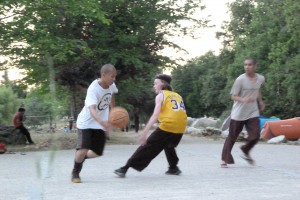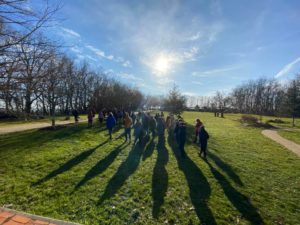
Upper Hamlet, 28 December 2019 – 4 December 2020
The community of Upper Hamlet invited teachers from around the world to join them at New Year for a week’s retreat. It was a week to live simply – and to simply live – in community. The teachers were not responsible for learning objectives or successful outcomes: the retreat offered space to take care of ourselves, to listen inwardly, to connect with others and to receive the deep nourishment constantly being offered by nature and by silence.
A Wake Up Schools Level I Retreat focuses on the first pillar of Wake Up Schools: embodiment. We don’t practice to learn tools or a curriculum; we practice to be. From the outset, the invitation to teachers was clear: please take good care of yourselves. In a beautiful orientation on the practice, Br Pháp Biểu encouraged us to take this week to refresh ourselves in simple living and to taste the joy of the practice, rather than worrying about getting everything right.
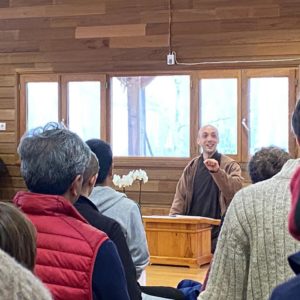
The community of Upper Hamlet offered us a powerful living example of this: whether sitting, working, eating or washing dishes, the brothers and lay friends cultivate an atmosphere infused with an awake, kind energy. Over and over, we practiced stopping and touching the peace available in this moment.
Each day we practiced deep relaxation: coming back to our body with compassion and awareness; inviting it to let go of tension and know that it’s okay to rest.
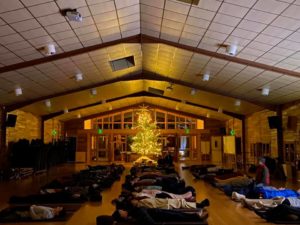
As we slowed down from the momentum of a busy Autumn term, we were more present to each moment. Our listening and sharings grew deeper and we were more open to the beauty available around us. We listened to a Dharma talk offered by Thich Nhat Hanh at the Mindfulness Retreat for Educators in Brock University, Ontario, in 2013. Thay shares his vision for Wake Up Schools and the importance of teachers taking time to care for themselves and to embody the practice:
For school teachers, the first thing to do is to go home to himself or herself. The way out is in. Go back to oneself and take care of oneself: learning how to generate a feeling of joy, learning how to generate a feeling of happiness, learning how to handle a painful feeling, a painful emotion. Listening to the suffering allows understanding and compassion to be born and to suffer less.
This is the first step and he or she has to do that.
A sangha, a community of practice in the neighborhood can help him, can help her to deepen their practice. You have to begin with yourself.
The school teacher also has members of their family; a partner or children. So after he has done it for himself, he can help the other person to do the same. It’s much easier. When you have not changed yourself, it’s very difficult to help change the other person, to help him or her suffer less.
With loving speech and deep listening, with more peace and gentleness in yourself, you become more pleasant, and that is why you can help the other person much more easily, and she or he will be able to do the same thing.
We become co-practitioners. We share the same values, we share the same spiritual practice, because we know that each day the situation improves: there’s more peace, less suffering, more joy, more happiness. The children will profit from that, because the children can practice very well also.
And when you have a united harmonious family, then you can bring that into your workplace. Then maybe first you have your class and you transform your class. Your class becomes a happier place. Your class can become a family because there are many children who are unfortunate. Their parents are not in good terms with each other. They fight; they make each other suffer and the child has had no chance to learn what love is.
The classroom may be the second chance for the child. The school teacher can play the role of the father or of the mother and can teach the young person how to love, what is love. Love is something real.
(You can watch the full talk below:)
One morning, we enjoyed a Teachers Workshop, which gave everyone the opportunity to be both a student and a teacher: connecting with our breath, walking meditation, deep relaxation and tangerine meditation.
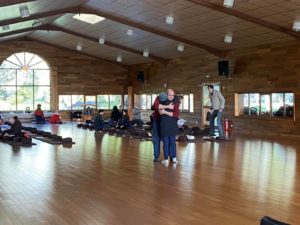
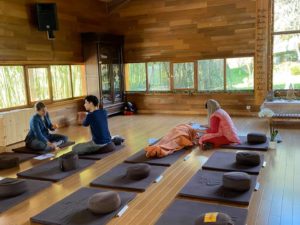
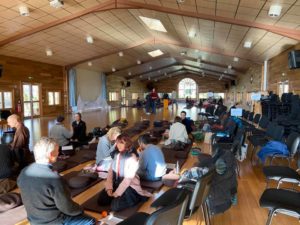
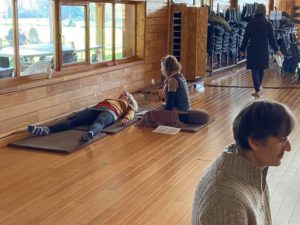
We began and ended each day together as a community – we sat, walked, chanted and received teachings such as the Discourse on Happiness:
To live in a good environment,
to have planted good seeds,
and to realize that you are on the right path —
this is the greatest happiness.The Discourse on Happiness, translated by Thich Nhat Hanh
It was also a time for celebrations: in the middle of the week, the entire community gathered at Lower Hamlet to welcome in the New Year. Sr Tuệ Nghiêm offered a series of 5 practices to help us to find and dwell in our true home, a place where there is love, spaciousness and peace. After this rich dharma talk we enjoyed dinner together, celebrated with many songs and skits then sat as a community and practiced as the New Year arrived. On 2 January Br Pháp Dung and Br Pháp Lưu led a ceremony to welcome the new graduates of our Level II programme in France, Wake Up Schools 123 étape 2.
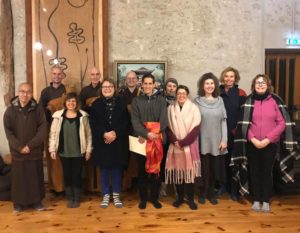
We had several bright and lively opportunities to hear from people’s personal and professional experience. In a panel discussion facilitated by Italian dharma teacher Adriana Rocco, practitioners shared on how they live with The Five Mindfulness Trainings. The five panelists offered a beautiful breadth of experiences from their lives in Kenya, Czech Republic, France, UK and Austria.
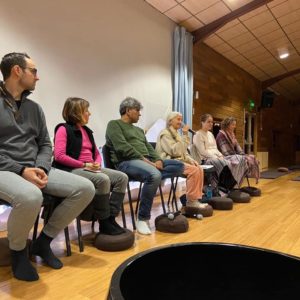
A morning Q&A panel shared joyful and deep practice, with Br Pháp Dung, Br Pháp Lai, Br Huệ Trực and Adriana Rocco. We also had an evening Teacher Panel, during which teachers from Vietnam, France and Germany shared about how they bring Wake Up Schools into their schools and classrooms and the local initiatives to support happy teachers.
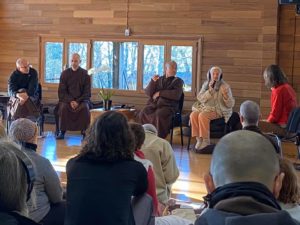
Practical workshops gave the opportunity to explore in smaller groups. Teachers explored activities for the classroom, how to create sangha groups for children; mindful approaches to creative writing, music and movement – and we also enjoyed a Tea Ceremony with Br Pháp Tiển, learning to bring fresh awareness and wonder to our cup of tea.
On our final morning the community offered a transmission of The Five Mindfulness Trainings to support people on their paths of practice. It was deeply touching to see the recipients receive the trainings, and we gathered in family groups afterwards to wish them well.
Br Pháp Lai’s Circle Sharing Family is pictured below.
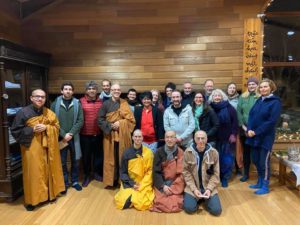
The final dharma talk of the retreat was given by Br Pháp Lưu – On Suffering and Happiness. He invited us not to run away or resist our suffering, but to recognise and embrace it with mindfulness, because it may be telling us something very important about our body or our mind. He shared that concentrating on impermanence can counteract our grasping habit of wanting things to be a certain way in order for us to be happy – releasing all our ideas about our happiness can be a profound practice that opens into freedom.
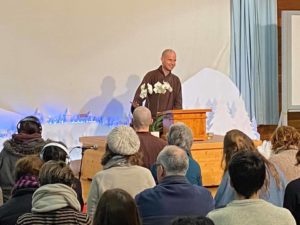
That evening, we enjoyed a Be In to reflect on and celebrate our week together. Teachers offered moving sharings of their experience and the transformations that had taken place in them, and we enjoyed song, rap, poetry, dance and laughter. The community showed their gratitude and support for teachers who every day share their lives and their practice with their students.
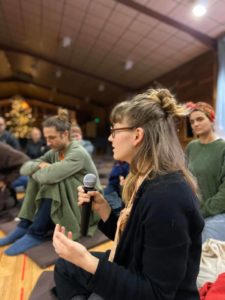
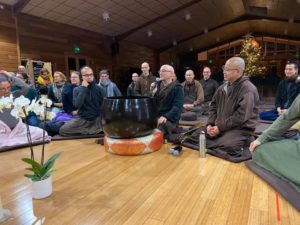
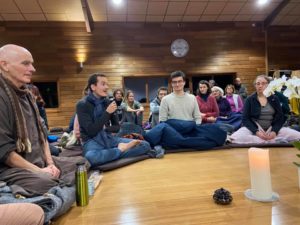
We began our journeys home – to France, India, Germany, Ireland, Czech Republic, USA, Spain, UK, The Netherlands, Austria, Poland, Italy, Switzerland and Canada. We co-created a very special space together; its openness, love and understanding continues in all of us.
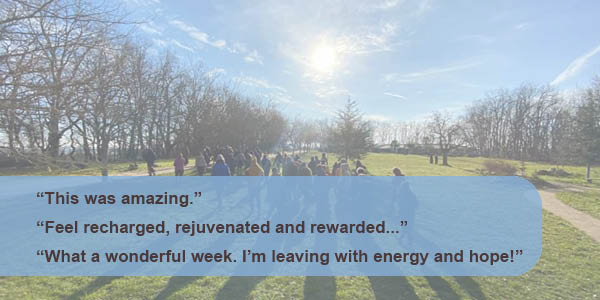
Thank you for being part of Wake Up Schools. Please enjoy this moment of beauty and peace from this week, and know that you carry us in your heart.
Wake Up Schools supports teachers of all ages, in all educational environments, to take care of themselves so that they can offer their kind, open presence to others.

